DPC
Digital Preservation Planning: Principles, Examples and the Future with Planets
![]()

PLANETS and the Digital Preservation Coalition (DPC) will be holding a joint briefing day: Digital Preservation Planning: Principles, Examples and the Future with Planets, on the 29th of July 2008, at the British Library Conference Centre, St Pancras, London.
The event will be an informal and interactive workshop allowing attendees to share knowledge and experience in digital preservation planning, setting strategy and policy plus first-hand experience of Planets tools and technology.
Attendees will also hear from DPC members about the approaches they have used in their organisations and the outcomes. There will be plenty of opportunity to ask questions and for discussion.
Planning is crucial to the process of preserving digital information and data. Planets has taken preservation planning as its research focus. From mid 2010, Planets will deliver downloadable software to help organisations plan and execute preservation activities.
Benefits of attendance
- Understanding of aspects of preservation planning, policy and strategy setting
- Real-life insight into other organisations’ approaches to preservation planning
- Awareness of the range of services and tools Planets will deliver
- Hands-on experience of Plato, Planets’ preservation planning tool
- Insight into identifying the characteristics of digital objects
- Understanding of working in a testbed environment
- An opportunity to ask questions and for discussion
Who should attend?
The event will appeal to anyone involved at any stage in digital preservation policy, strategy and planning cycle. (e.g. librarians archivists, digital librarians and archivists, repository mangers, software developers, vendors, policy managers etc and others working in a wide range of settings).
Programme
|
Time |
||
|
9.00 |
Registration and coffee |
|
|
Morning Session Chair – Frances Boyle, DPC |
||
|
09.30 |
What's it all about? Scene Setting & Overview for the Day (PDF 406KB) |
Frances Boyle, DPC |
|
10.15 |
Andreas Rauber, Vienna University of Technology |
|
|
10.45 |
Constructing a Preservation Policy: the case of the UK Data Archive (PDF 378KB) |
Matthew Woollard, UKDA |
|
11.15 |
Break and Coffee |
|
|
11.30 |
Natalie Walters, Wellcome Library |
|
|
12.00 |
Preservation Planning (Part 1): Workflow and the Plato tool (PDF 2.2MB) |
Christoph Becker, Vienna University of Technology |
|
12:30 |
Lunch |
|
|
Afternoon Session Chair – Frances Boyle, DPC |
||
|
13:00 |
Preservation Planning (Part 2): Simulation and practical exercises |
Christoph Becker & Andreas Rauber, Vienna University of Technology |
|
14.10 |
Christoph Becker |
|
|
14.30 |
Manfred Thaller, University of Cologne |
|
|
15.00 |
Break and Coffee |
|
|
15.15 |
Matthew Barr, HATII, University of Glasgow |
|
|
16.15 |
Interactive discussion session |
Prof. Kevin Schürer, UKDA |
|
17.15 |
End |
|
Key to acronyms:
| PLANETS | Preservation and Long-term Access through NETworked Services |
| UKDA | UK Data Archive |
| HATII | Humanities advanced Technology and Information Institute, University of Glasgow |
Mind the Gap: Assessing Digital Preservation Needs in the UK
June 2008
The Review Board for the ITT 'Mind the Gap' - follow up study reviewed responses to the ITT in mid-June. Whilst the Review Board found much to commend in the proposals it was decided not to award a contract at this time. The brief will be re-scoped to focus on actions for which the DPC or its members can take responsibility for and it will have a strong practical and achievable focus.
The 'Mind the Gap' report was published with 21 recommendations aimed at a range of stakeholders. To gauge which of these are the most important to the DPC community, members were asked to participate in a survey to consider the final 'Mind the Gap' recommendations. They voted on which recommendations would impact on their work and deliver the greatest benefit to the digital preservation community if achieved successfully.
Mind the Gap
Added on 1 June 2008
Report reveals major gaps in long term management of valuable digital assets
15th February 2006
A 'state of the nation' report today reveals that less than 20% of UK organisations surveyed have a strategy in place to deal with the risk of loss or degradation to their digital resources - despite a very high level of awareness of the risks and potential economic penalties.
With the release today of the report, Mind the gap: assessing digital preservation needs in the UK, the Digital Preservation Coalition (DPC) aims to help government, public institutions and private companies turn high awareness into concerted action.
ICPSR become DPC Ally
Added on 30 April 2008
The Inter-University Consortium for Political and Social Research (ICPSR)
It gives me great pleasure to announce that The Inter-University Consortium for Political and Social Research (ICPSR) has become an allied organisation of the Digital Preservation Coalition (DPC).
The ICPSR (http://www.icpsr.umich.edu/ICPSR/) is, like the DPC a membership organisation. It encourages and facilitates research and instruction in the social sciences and related areas by acquiring, developing, archiving, and disseminating data and documentation relevant to a wide spectrum of disciplines, and by conducting related instructional programs.
Chris Rusbridge, a Digital Preservation Coalition Board Director, said:
What to preserve? Significant Properties of Digital Objects
![]()

Significant properties are essential characteristics of a digital object which must be preserved over time for the digital object to remain accessible and meaningful. Proper understanding of the significant properties of digital objects is critical to establish best practices and helps answer the fundamental question related to digital preservation: what to preserve?
The importance of significant properties has been highlighted by a number of notable digital preservation initiatives in recent years. These include a range of projects funded by the Joint Information Systems Committee (JISC) and the European Union, in which work has been undertaken to investigate the factors affecting decisions on significant properties, to establish generic models for determining them, to develop tools and services for describing and extracting them, or simply to understand complex digital object types, using the concept of significant properties as a starting point.
JISC, the British Library and the Digital Preservation Coalition (DPC) are organising a joint workshop on 7th April at the British Library Conference Centre. The intention is to bring together the relevant projects and report on progress to date.
To open PDFs you will need Adobe Reader Neil Grindley (JISC) Welcome and introduction |
 Keynote Speaker Andrew Wilson (NAA) Presentation PDF 199KB |
 Stephen Grace (CeRch) INSPECT Project Presentation PDF 1.3MB |
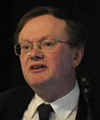 David Duce (OBU) JISC Study 1 - Vector Images Presentation PDF 1.6MB |
 Mike Stapleton, (SSL) JISC Study 2 - Moving Images Presentation PDF 561KB |
 Brian Matthews (STFC) JISC Study 3 - Software Presentation PDF 1.1MB |
 Richard Davis (ULCC) JISC Study 4 - e-Learning Objects Presentation PDF 1.0MB |
 Adrian Brown (PLANETS) Preservation Characterisation in PLANETS Presentation PDF 1.5MB |
 Roger Lloyd (Barclay Wealth) Industry / Media Presentation PDF 839KB |
 Colin Neilson (DCC) SCARP Project Presentation PDF 719KB |
 Stephen Rankin (on behalf of David Giaretta) (DCC) Digital Object Semantics Presentation PDF 453KB |
 Cal Lee (UNC Chapel Hill) SIGPROPS Presentation PDF 193KB |
 Andrew Wilson (NAA) Comments/summary |
 Chair, Chris Rusbridge (DCC) Discussion |
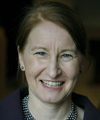 Frances Boyle (DPC) Closing Remarks |
Key to acronyms:
| JISC | Joint Information Systems Committee |
| NAA | National Archives of Australia |
| CeRch | Centre for e-Research , King's College London (incorporating the Arts & Humanities Data Service) |
| OBU | Oxford Brookes University |
| SSL | System Simulation Ltd. |
| STFC | Science and Technologies Facilities Council |
| ULCC | University of London Computing Centre |
| PLANETS | Preservation and Long Term Access Through Networked Services |
| TBC | To be confirmed |
| DCC | Digital Curation Centre |
| UNC | University of North Carolina |
| DPC | Digital Preservation Coalition |
Photographs

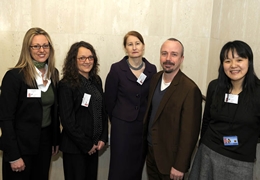
The Organisers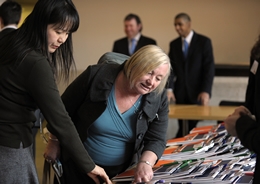
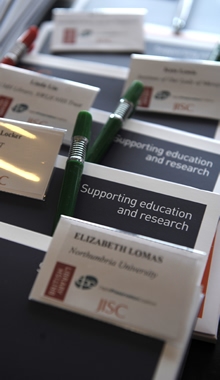
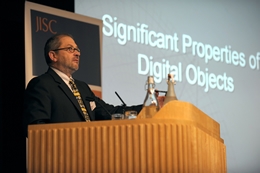
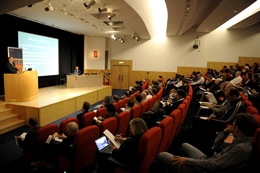
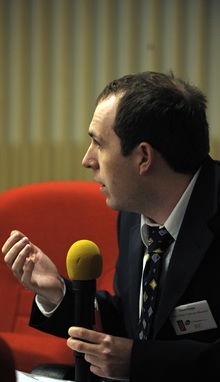

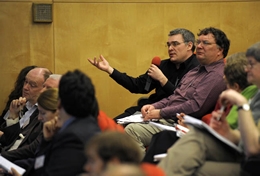
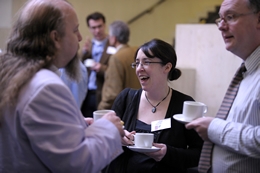

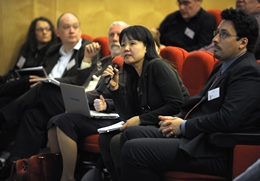
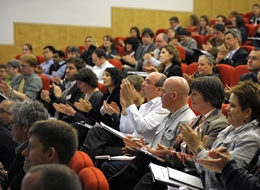
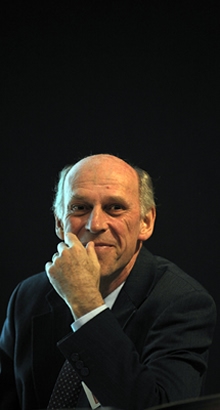
PDF should be used to preserve information for the future
Added on 1 April 2008
Good news the already popular PDF file format adopted by consumers and business alike is one of the most logical formats to preserve today's electronic information for tomorrow.
According to the latest report released today by the Digital Preservation Coalition (DPC), Portable Document Formats (PDF) is one of the best file formats to preserve electronic documents and ensure their survival for the future. This announcement will allow information officers to follow a standardised approach for preserving electronic documents.
Information management and long-term preservation are major issues facing consumers and businesses in the 21st Century. This report is one of a series where The Digital Preservation Coalition (DPC) aims to think about and address the challenges facing us.
JPEG 2000 a great step forward for the archival community
Added on 1 February 2008
The Digital Preservation Coalition has examined JPEG 2000 in a report published today. The report concludes that JPEG 2000 represents a great stride forward for the archival community. The format now allows for greater compression rates and a recompression rate that is visually lossless.
The findings come as the Digital Preservation Coalition launch its latest 'Technology Watch Report' written by Dr. Robert Buckley, a Research Fellow with Xerox, 'JPEG 2000 - a practical digital preservation standard?'. The report looks in-depth at the new format and the challenges it has to cope with. JPEG 2000 is widely used to collect and distribute a variety of images from geospatial, medical imaging, digital cinema, and image repositories to networked images. Interest in JPEG 2000 is now growing in the archival and library sectors, as institutions look for more efficient formats to store the results of major digitisation programmes.
DP Awards 2007 Showcase and Shaping the DPC
Programme
|
09:30 |
Registration |
|
10:00 |
Welcome & Outline of Day - Frances Boyle, DPC Executive Director The 2007 DP Awards Showcase |
|
10:10 |
The Judges Perspective - Kevin Ashley, Chair of the Judges |
|
10:25 |
LIFE - Richard Davies |
|
10.50 |
Web Curator Tool - Philip Beresford |
|
11:15 |
Morning Break |
|
11.30 |
PRONOM and DROID - Adrian Brown |
|
11.55 |
Paradigm - Susan Thomas |
|
12.20 |
Digital Repository Audit and Certification |
|
12.45 |
Summing up |
|
13.00 |
Lunch Shaping the DPC Session |
|
13.45 |
Outline of the Afternoon Session - Frances Boyle |
|
14.00 |
Breakout Groups |
|
15.00 |
Afternoon Break |
|
15.20 |
Speed Reporting |
|
15.45 - 16.15 |
Summing Up and Close - Frances Boyle |
Background
The Digital Preservation Coalition (DPC), now in its sixth year, seeks to be a proactive membership organization fostering joint action to address the urgent challenges of securing the preservation of digital resources in the UK.
At the start of the new chapter in its history, the DPC would like to hear from its members and to provide them with an opportunity to shape its next, hopefully equally successful and productive, phase. So please do attend this event which will go some way to inform DPC activities and priorities.
About the Day
The morning session will comprise of presentations from the five short-listed DP Award projects. This will provide you with an opportunity to learn more about the diverse and fascinating projects that were showcased at the Conservation Awards ceremony in September. We will also hear the Judges' perspective into how they evaluated the projects. You may even pick up some tips for the 2009 DP Awards!
http://www2.digitalpreservationcoalition.co.uk/advocacy/2007-shortlist.html
This session will be chaired by Kevin Ashley, the Chair of the Judging Panel.
After a nutritious lunch and an initial briefing you will break up into groups to focus on your selected topics. We will endeavour to ensure that you are assigned to your preferred group but we cannot always guarantee this and indeed may have to assign you to another group. There will however be an opportunity to contribute views on all issues that will be covered during the day. Full details of your group allocation will be sent to you before the event.
The key recommendations, comments, issues which arise from the discussion will be shared with other participants through a 'speed reporting' session (more about this on the day) followed by the final summing up of all those 'big ideas'.
Breakout Group Themes
The following are the themes which the groups will consider. The bullet points are merely suggestions to kick start the discussions - you may wish to consider other issues within your area - so please do feel free to! Further details will be provided before the event. Please indicate your preferences for the groups, in 1-5 order where (1) is your preferred option.
-
'Top 5' for 2008 - Planning for the Near Future:
- Consider what are the most (5) important issues in the digital landscape over the coming year
- How will these impact on digital preservation?
- What are the threats and opportunities that these issues will bring to digital preservation
- How can the DPC contribute to these discussions?
- How can the DPC take forward these issues on behalf of its members?
- DPC Governance:
- Look at the mission - is this still relevant? If not why not? [A copy of the published goals etc will be provided]
- How would you improve the mission statement?
- Look at the goals, aims and principles. Could these be recast, reshaped?
- If so how, why etc.
- DPC Activities:
- What type of event do you find useful e.g. workshops, conferences?
- What activities would you like the DPC to run that they have not previously done?
- Is the DPC 'Handbook of Digital Preservation' still useful?
- Would you like to see the Handbook updated?
- Would you like to see a follow up to 'The Mind the Gap' report?
- Would you like to see more training programmes offered through the DPC?
- Outreach:
- Website - how could this be improved?
- What information would you like to see on the website?
- Awareness alerting tools. What tools work best for you? For example the 'What's New' list on the website, RSS feeds, mailing lists etc.
- Create some strap/tag lines for the DPC. Why are these meaningful?
- Suggest 5 pragmatic ways how the DPC could continue to serve its members.
- Future Gazing - Making Ready for the Mid Future :
- Picture star date 2017, what will the digital landscape comprise of then for all our constituencies e.g. learners, citizens, researchers, government etc?
- What emerging technologies, trends (social, organizational etc), developments etc will impact on digital preservation?
- How can we ensure that the digital preservation component is kept on the agenda of other allied digital initiatives?
- How can the DPC empower its members to be fit for the 'digital preservation purpose' now and in the future?
Who Should Attend?
Colleagues from member organizations whatever your role and interest is in digital preservation or related digital asset management and stewardship areas. Your views and comments would be most welcome.
Benefits of Attendance
- A chance to learn from exemplars of good practice from the DP Award short-listed projects
- To network and engage with colleagues from other member organizations
- An opportunity to air your views on matters digital preservation
- A chance to dabble in 'digital gazing'
- To contribute to, and take forward the work and aims of the DPC
- Finally to become a shaper of the DPC
DPC/BL Joint JPEG 2000 Workshop

Introduction
The JPEG2000 image compression technique has been cited by experts as a new archiving format for digital images. It is both a preservation and delivery format, and has been seen as a possible alternative to the TIFF format which most institutions use as a long-term archiving standard. Produced by both imaging experts and the Joint Photographic Experts Group, it is now a recognised ISO standard. The standard JPEG file format which is so widely in use is not yet an ISO standard.
JPEG 2000 allows a wide range of uses and can support a wide range of formats and multiple resolutions. It can also offer both lossy and lossless compression modes. Most importantly it is a flexible file format which allows metadata to be built in to the file, a vital element of the digital preservation process.
However, the standard is not yet widely in use and there is as yet no native support for it in internet browsers. More investigation and practical implementations of the standard are yet to be seen but it could be used as a potential archival standard.
The workshop
This forum will look more into the details of the standard and expert speakers who are familiar with the standard or have implemented it will share their experiences. The forum will also include industry experts to talk about the creation of the file formats. Delegates will learn about the benefits of the standard, especially with regard to digital preservation and whether it is worth implementing it within their own institutions as an image storage format. Guest speakers include Bill Comstock, Harvard College Library, Christoph Becker, Vienna University of Technology, Manfred Thaller, Cologne University and Jim King, Adobe.
Who should attend the workshop?
Digital Repository Developers, Library and Archives professionals, Digital Preservation (technology watchers) future trends, Information Managers (public sector) and anyone with large numbers of images within their institutions or companies.
Cost of the workshop is £60 for DPC members and £100 for non members
Programme
The workshop will be chaired by Professor Roger James, Head of Digital Library Infrastructure, British Library.
Morning session|
09:30 |
Arrival, registration and coffee |
|
10:00 |
Welcome and introduction - Rory McLeod, Digital Preservation Manager BL |
|
10:10 |
Update on JPEG 2000 and JPEG activities (PDF 810KB) - Richard Clark, Director of Elysium Ltd., JPEG webmaster |
|
10:40 |
"Preservation Planning in PLANETS" (PDF 1.3MB) - Christoph Becker, Vienna University of Technology. |
|
11:10 |
"JP2's preservation capabilities within PLANETS" (PDF 651KB) plus Mona Lisa Images (PDF 10MB) Volker Heydegger, Cologne University |
|
11:40 |
Q+A |
|
12:00 |
Lunch |
Afternoon session
|
13.00 |
"Using pSNR thresholds to modulate the degree of lossy compression in JPEG2000 files" (PDF 7.7MB). Bill Comstock, Head, Imaging Services, Harvard College Library |
|
13:30 |
"How do I decide if JPEG2000 is for me? Choosing standards when there are so many" (PDF 133KB). Simon Tanner, Kings College London |
|
14:00 |
"Document Formats and Image Formats" (PDF 3.4MB) |
|
14:30 |
Q & A followed by coffee |
|
15:00 |
Panel Session chaired by Roger James. |
E-Journal Archiving and Preservation Workshop
![]()

Overview and Presentations
The DPC, The British Library and JISC held a 1 day workshop looking at the issue of e-journal archiving and preservation. The workshop brought together international stakeholders from the information world, including publishers, librarians and representatives from archiving solution providers. The day was chaired by Hazel Woodward of Cranfield University and provided an opportunity to review what initiatives are currently in place and what more developments are needed.
To open PDFs you will need Adobe ReaderThe first morning session saw Anne Kenney (PDF 519KB) of Cornell University provide an overview of the e-journal archiving landscape, drawing on work that was done in 2006 to pull together the opinions of library directors and also provide a detailed review of 12 archiving solutions. This was followed by presentations from 4 different providers of archiving and preservation services. Victoria Reich (PDF 13MB) , Director of the LOCKSS program, gave an overview of LOCKSS and CLOCKSS and emphasised that the more archived copies of an item the safer it is. Eileen Fenton (PDF 593KB), Executive Director of Portico, described the service provided by Portico which archives peer review scholarly journals and to date has more than 5,800 journals from 30 publishers. Erik Oltmans (PDF 377KB), Head of Acquisitions and Cataloguing at the National Library of Netherlands (Koninklijke Bibliotheek) spoke of the e-deport service which from a starting point in 1995 is now ingesting 50,000 items a day. The UK national library perspective was given by Richard Boulderstone (PDF 418KB), Director of e-Strategy at The British Library, who showed that the traditional scholarly communication process is changing and this requires new processes and durable technical architecture to ensure that archiving solutions are able to satisfy requirements now and in the future.
The afternoon session saw presentations from the publisher and university library perspectives. Steven Hall (PDF 156KB), Commerical Director at Wiley-Blackwell, demonstrated that publishers take the issue of archiving seriously but there needs to be more clarification when it comes to access. Preservation is not the same as access and access is not the same as open access. Paul Ayris (PDF 440KB), Director of Library Services at UCL, said that UCL were moving towards the e-only delivery of journals and therefore were reviewing what solutions need to be in place to ensure continued access. Paul also highlighted the potential costs of archiving.
The workshop finished with a question and answer session which enabled delegates to pose questions to the expert panel and Hazel Woodward brought the day to an end by summarising the themes of the day.
Morning session: The E-Journal Preservation Landscape
Chair: Hazel Woodward
|
9:30-10:00 |
Arrival, registration and coffee |
|
10:00-10:10 |
Welcome and introduction |
|
10:10-10:50 |
Keynote "Surveying the e-Journal Preservation Landscape" (PDF 519KB) |
|
10:50-11:10 |
LOCKSS and CLOCKSS (PDF 13MB) |
|
11:10-11:30 |
Portico (PDF 593KB) |
|
11:30-12:00 |
Break and coffee |
|
12:00-12:20 |
The KB Approach (PDF 377KB) |
|
12:20-12:40 |
The British Library Ejournal Digital Archive (PDF 418KB) |
|
12:40-13:00 |
Q+A |
|
13:00-14:00 |
Buffet lunch |
Afternoon session: High-level Principles of E-journal Archiving and Preservation Services
Chair: Hazel Woodward
|
14:00-14:25 |
The Publishers perspectives (PDF 156KB) |
|
14:25-14:50 |
The Research Libraries' perspectives (PDF 440KB) |
|
14:50-15:20 |
Break and Coffee |
|
15:20-16:10 |
Panel Discussion: High-level Principles of e-journal Archiving and Preservation Services |
|
16:10-16:30 |
Closing remarks |
Subcategories
Blog
Unless otherwise stated, content is shared under CC-BY-NC Licence






























































































































